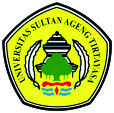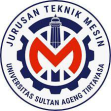The Effect of Power on Drying Rate of Sugarcane Bagasse Drying by Using Microwave
Abstract
The sugarcane is a food plant that is widely used in daily life as a sweetener This plant is processed in a factory to produce sugar. In sugar processing, it needed a large amount of energy where its source is bagasse. As a fuel, sugarcane bagasse still has a moisture content of around 50% so the calorific value is quite low. The drying process is needed to increase this calorific value. There are many drying processes that can be used where one of them is microwave drying. The microwave drying is faster if compared to hot air. In this study, the sample of sugarcane bagasse used was chopped to a size of about 3 cm. The mass of samples used weight of 100, 125 and 150 gr and placed in an aluminum foil. The measurement of sample mass is done every minute. The electrical power used varies by 50%, 60%, 70%, 80%, 90% and 100% of the maximum power of the microwave oven. The result of the study shows a proportional reduction in moisture ratio for each power percentage difference used. The heavier sample mass will result in a smaller drying rate. The regression shows that the normal logarithmic equation is more suitable for the drying rate equation.
Keywords
Full Text:
PDFReferences
Plantation, Performance Report of Directorate General, Jakarta,
https ://www.esteboo.com/selain-untuk-kesehatan-ini-lho-
manfaat-lain-dari-tanaman-tebu, [Accessed: 28-Sept-2019]
https://www.123rf.com/photo_108910449_sugarcane-
bagasse-close-up-of-bagasse-is-the-fibrous-material-left-over-
from-the-sugarcane-extractio. html, [Accessed: 28-Sept-
.
Saha K., Maharana A., Sikder J., Chakraborty S., Curcio S. and
Drioli E. Continuous production of bioethanol from sugarcane
bagasse and downstream purification using membrane
integrated bio-reactor. Catalysis Today. 2019; 331:68-77.
Available from: http://dx.doi.org/10.1016/j.cattod.2017.
031
Oliveira C. M., Cruz A. J. G., and Costa C.B.B. Improving
second-generation bioethanol production in sugarcane
biorefineries through energy integration. Applied Thermal
Engineering. 2016;109:819–827. Available from: http:
//dx.doi.org/ 10.1016/j.applthermaleng.2014.11.016
Hilares R. T., Kamoei D. V., Ahmed M. A., da Silva S. S., Han
J., and dos Santos J. C. A new approach for bioethanol
production from sugarcane bagasse using hydrodynamic
cavitation assisted-pretreatment and column reactors.
Ultrasonics – Sonochemistry. 2018;43:219–226. Available
from: http:// dx.doi.org/ 10.1016/j.ultsonch.2018.01.016
Bhardwaj N. K., Kaur D., Chaudhry S., Sharma M. and Arya S.
Approaches for converting sugarcane trash, a promising agro
residue, into pulp and paper using soda pulping and elemental
chlorine-free bleaching, Journal of Cleaner Production.
;217:225-233. Available from: http://
dx.doi.org/10.1016/j.jclepro.2019.01.223
Varma A. K. and Mondal P. Pyrolysis of sugarcane bagasse in
semi-batch reactor: Effects of process parameters on product
yields and characterization of products, Industrial Crops and
Products. 2017;95:704–717. Available from:
http://dx.doi.org/ 10.1016/j.indcrop.2016.11.039
Savou V., Grause G., Kumagai S., Saito Y., Kameda T., and
Yoshioka T. Pyrolysis of sugarcane bagasse pretreated with
sulfuric acid. Journal of the Energy Institute. 2018; Vol, xxx:1–
Available from: http://dx.doi.org/10.1016/j.joei.2018.06.
Conag A. T., Villahermosa J. E. R., Cabatingan L. K. and Go A.
W. Energy densification of sugarcane bagasse through
torrefaction under minimized oxidative atmosphere. Journal of
Environmental Chemical Engineering. 2017; 5:5411–5419.
Available from: http://dx.doi.org/10.1016/ j.jece.2017.10.032
Centeno-González F. O., Lora E. E. S., Nova H. F. V., Neto M.,
Reyes L. J., Ratner A. M. M., and Ghamar, M. CFD modeling of
combustion of sugarcane bagasse in an industrial boiler. Fuel.
;193:31–38. Available from: http://dx.doi.org/
1016/j.fuel.2016.11.105
Singh O. K. Exergy analysis of a grid-connected bagasse-based
cogeneration plant of sugar factory and exhaust heat utilization
for running a cold storage. Renewable Energy. 2019;143:149-
Available from: http://dx.doi.org/
1016/j.renene.2019.05.012
Contreras-Lisperguer R., Batuecas E., Mayo C., Díaz R. and
Springer C. Sustainability assessment of electricity
cogeneration from sugarcane bagasse in Jamaica, Journal of
Cleaner Production. 2018;200:390-401. Available from:
http://dx.doi.org/ 10.1016/j.jclepro.2018.07.322
Restuti D. and Michaelowa A. The economic potential of
bagasse cogeneration as CDM projects in Indonesia. Energy
Policy. 2007;35;7:3952-3966. Available from:
http://dx.doi.org/ 10.1016/j.enpol.2007.01.014
Daniyanto, Sutidjan, Deendarlianto and Budiman A.
Torrefaction of Indonesian sugar-cane bagasse to improve bio-
syngas quality for gasification process, Energy Procedia.
;68:157-166. Available from: http://dx.doi.org/
1016/j.egypro.20015.03.244
Mujumdar A. S. 1987. Handbook of Industrial Drying, Second
Edition, New York, Marcel Dekker.
Oliveira L. F. d., Correa J. L. G., Tosato P. G., Borges S. V. J.
G., Alves L. F., and Fonseca B. E. Sugarcane Bagasse Drying in
a Cyclone: Influence of Device Geometry and Operational
Parameters. Drying Technology: An International Journal.
;29;8:946-952. Available from:http://dx.doi.org/
31080/07373937.2011.56206
Correia L. E. M. Bagasse drying, in Seminário de Avaliação do
Bagaço – São Paulo Sopral – Sociedade de Produtores de
Açúcar e Álcool, 1- 15, in Portuguese.
Salermo M. and Santana O., 1986. Economic aspects about
bagasse dryer. ICINAZ report. No. 5:44-49 (in Spanish).
Nebra S. A. and Macedo I. C. M. Pneumatic drying of bagasse.
International Sugar Journal. 1989;91;1081:3-8.
Rueda-Ordóñeza Y. J. and Tannousa K. Drying and thermal
decomposition kinetics of nonisothermal thermogravimetric
analysis, Bioresource Technology. 2018; 264:131–139.
Available from: http://dx.doi.org/10.1016/
j.biortech.2018.04.064
Gao F. Comparison of Microwave Drying and Conventional
Drying of Coal. Master Thesis, Queen’s University Kingston,
Ontario, Canada. 2010:1–48.
Picou Fennell L. F. and Boldor D. Continuous microwave drying
of sweet sorghum bagasse biomass, Biomass and Bioenergy.
;70:542–552. Available from: http://dx.doi.org/
1016/j.biombioe.2014.08.012
Shah S. and Joshi M. Modeling Microwave Drying Kinetics of
Sugarcane Bagasse. International Journal of Electronics
Engineering. 2010;2;1:159-163.
Amer M., Nour M., Ahmed M., Ookawara S. and Elwardany A.
The effect of microwave drying pretreatment on dry
torrefaction of agricultural biomasses. Bioresource Technology.
;286. Available from: http://dx.doi.org/
1016/j.biortech.2019.121400
Si C., Wu J., Zhang Y., Liu G., and Guo Q. Experimental and
numerical simulation of drying of lignite in a microwave-
assisted fluidized bed. Fuel. 2019;242:149-159. Available
from: http://dx.doi.org/10.1016/j.fuel.2019.01.002
DOI: http://dx.doi.org/10.36055/fwl.v2i1.7396
Refbacks
- There are currently no refbacks.







